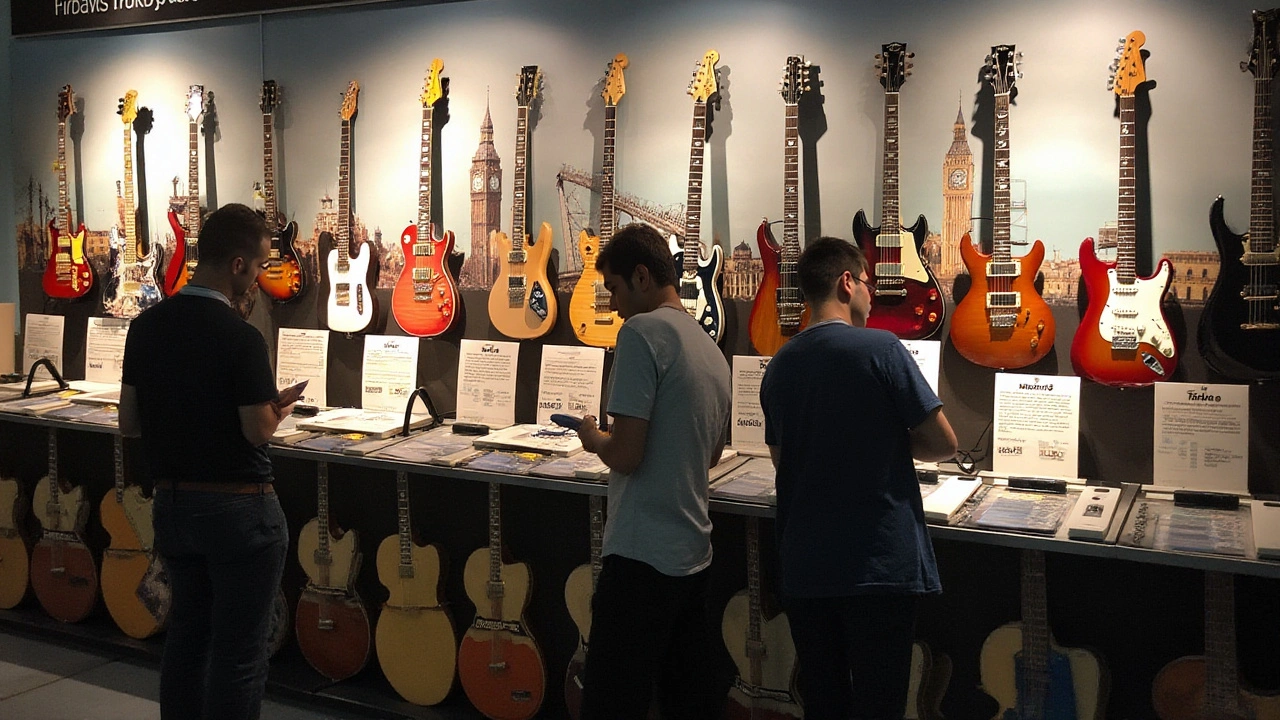Diving into the world of electric guitars can be both thrilling and daunting, especially when faced with so many choices. Whether you're a novice just starting out or a seasoned player looking to upgrade, finding the right guitar within your budget is crucial.
In this guide, we'll explore ten electric guitars that cater to a wide range of budgets, from entry-level options perfect for learning, to mid-range models that offer a bit more sophistication, and high-end guitars for those who crave the best in sound and craftsmanship.
Join us as we uncover the best picks, offer some insider tips on what to look for, and help you strum your way to musical bliss without breaking the bank.
Entry-Level Guitars
Embarking on your musical journey with an electric guitar doesn’t have to break the bank, and thankfully, budget guitars today offer more quality and value than ever. For beginners, an electric guitar that balances playability with affordability is key to fostering progress and passion. The market is packed with fantastic options that cater to those starting to explore their musical talents. Brands like Squier, Ibanez, and Epiphone have curations that provide an excellent balance of quality and affordability, often under the guidance of their more premium brand siblings.
Take the Squier Affinity Series, for example, a quintessential choice for novices. As a subsidiary of Fender, Squier leans on their rich history and experience to craft approachable yet robust instruments. The Affinity Stratocaster shines with features often seen in pricier models, such as a comfortable 'C' shape neck and versatile pickups that allow beginners to experiment with different music instruments styles without overwhelming complexities. It's these kinds of nuances that transform practice from a chore into a pleasure.
Epiphone, not to be overshadowed, offers the Les Paul SL as an entry-level marvel, tapping into the iconic Gibson legacy. Although it lacks the heft of higher-end models, the simplicity in design and sound makes it an incredible tool for learning, all while maintaining the classic Les Paul aesthetic. This guitar exemplifies how a learner need not compromise on style or sound just because they are at the beginning stage.
“You don't need the most expensive guitar to make great music,” says renowned guitarist and instructor Justin Sandercoe.
“It's more about how it feels in your hands and how much you're willing to put into mastering it.”His advice rings true, highlighting that the tactile pleasure of playing is as significant for a learner’s progression as any technical spec.
Now, focusing on statistics could also guide a beginner's decision. In 2023, data from a popular music retailer showed that over 60% of beginners who stuck with lessons for more than a year started with entry-level instruments like the ones listed earlier. This data echoes the sentiment that having an affordable, yet capable, instrument is essential. It's not just about what the guitar offers in terms of branding or prestige; it’s about the kind of musical desire it kindles in its owner.
The Ibanez GIO Series deserves mention too. Offering a sleek, modern look with comfortable playability and two humbucking pickups, it lets beginners dabble in heavier music genres. The unique design is appealing to eyes drawn to the modern aesthetic, while its solid construction supports myriad learning genres. When selecting a starter guitar, it's pivotal to match it with the genre that excites you, which in turn keeps motivation levels high.
Choosing the right electric guitars at the outset can truly set the stage for an enriching musical journey. The initial investment needn’t be grand, but careful consideration towards usability and sound variety ensures that the first steps into musicianship are supported and encouraged through sophistication and accessibility. With an entry-level guitar that marries affordability with functionality, the stage is set for budding guitarists to make their very own magic.

Mid-Range Picks
The sweet spot for many guitarists lies within the mid-range market, where you can snag a quality electric guitar without venturing into premium prices. Usually, these guitars balance high-end craftsmanship with affordability, offering budding musicians and experienced players a burst of inspiration and reliability. Among these, the Fender Player Stratocaster makes quite a splash, known for its iconic looks and versatility. It's a go-to choice for players of genres ranging from rock to jazz, providing a classic Strat sound that's both crisp and full-bodied. The comfortable neck and traditional alder body mix tradition with modernity, making it an ideal choice for varied estilos.
Another fine contender in this category is the PRS SE Custom 24, which showcases the perfect blend of Paul's signature design and affordability. The guitar stands out with its beautifully quilted maple top and signature PRS bird inlays, making it as aesthetically pleasing as it is sonically satisfying. It delivers a powerful range of tones thanks to the SE 85/15 pickups, which excel in both clarity and punch. These models are perfect for expressive solos and complex chord structures, allowing artists to explore intricate musical narratives.
Budget guitars such as these often include additional features not found on entry-level models, such as locking tuning pegs or push-pull coil taps, allowing for greater flexibility in sound shaping. The Yamaha Pacifica 112V is another stalwart in the mid-range field, with a versatile HSS configuration that provides tonal variety. Its beautifully contoured body ensures comfort during long performances, and its Alnico V pickups are perfect for those seeking a brighter edge to their sound.
PRS's designer, Paul Reed Smith, once said, "The thrill of playing a guitar that's effortless, that sings, that happens when customers get their hands on a PRS," which encapsulates the joy that a mid-range pick can offer when perfected with precision.
For musicians weighing their options, understanding the value of music instruments in this tier goes beyond specs. It's about how the guitar feels in hand, how it's able to reflect the individual player's nuances and how well it adapts across different musical landscapes. A good mid-range guitar is more than a stepping-stone; it's often a lifelong companion, capable of growing with the player and evolving as their skills and style mature.

High-End Models
For musicians who've navigated their journey beyond the basics and are now looking to invest in a more prestigious electric guitar, high-end models offer a blend of craftsmanship, sound quality, and aesthetic appeal that is hard to match. These guitars are not just instruments; they are works of art, often handcrafted by skilled luthiers who pour their heart and soul into every curve and finish. Notable brands in this realm include Gibson, Fender, and PRS, each offering unique features that cater to different playing styles and preferences.
The Gibson Les Paul Standard is a timeless classic revered by rock legends and aspiring artists alike. Known for its thick, warm tones, it features a mahogany body with a maple cap, contributing to its unique sound. The humbucker pickups provide a powerful output that can handle anything from jazz to heavy metal. What makes it truly special is the attention to detail in its build—the binding, fretwork, and finishing are all of superior quality, making this guitar not only sound incredible but feel luxurious too.
The Fender American Professional Stratocaster, on the other hand, is synonymous with versatility. Its design, initially brought to life by Leo Fender himself, offers a bright and clear sound which makes it a favorite among blues and funk players. The alder body and maple neck provide a smooth playing experience, while the single-coil pickups ensure every note rings out with precision. With the introduction of V-Mod pickups, the Stratocaster delivers even more tonal variety, catering to a wide range of musical genres.
Paul Reed Smith, or PRS, stands out with the Custom 24, an instrument that has redefined what a high-end electric guitar should be. Known for its exquisite finishes and bird inlays, the Custom 24 is a staple in the PRS lineup. Its dual humbuckers offer a wide range of sonic possibilities, while the tremolo bridge and locking tuners ensure perfect pitch and sustain. PRS guitars are built for players looking for a refined sound with each tonal adjustment accessible at the turn of a knob.
"We believe that when technique meets artistry, true greatness can be achieved." – Paul Reed Smith
Investing in a high-end guitar is not just about acquiring an instrument, but also about joining a legacy. These guitars hold their value over time, not only in monetary terms but in the joy and satisfaction they bring to their owners. When choosing a high-end model, factors like body shape, neck dimensions, and electronics should be carefully considered, along with one's personal playing style and tonal needs.
To further understand what makes these guitars unique, here's an overview comparing some key specifications:
| Model | Body Material | Pickups | Price Range |
|---|---|---|---|
| Gibson Les Paul Standard | Mahogany/Maple | Humbucker | $2,499 - $3,499 |
| Fender American Professional Stratocaster | Alder | Single-Coil | $1,499 - $1,699 |
| PRS Custom 24 | Mahogany/Maple | Humbucker | $3,599 - $4,499 |
In summary, choosing a high-end electric guitar involves thoughtful consideration of how each instrument aligns with personal needs and musical aspirations. These guitars are an investment in creativity, offering quality that is designed to inspire and elevate a player's artistry for years to come. Whether chasing the iconic sounds of the past or experimenting with new sonic landscapes, a high-end electric guitar can be the perfect partner in your musical journey.

Key Buying Tips
When it comes to purchasing an electric guitar, especially for those who are new to the world of music or perhaps seasoned players looking to add to their collection, there are several key factors to consider that can help ensure you make the right choice. First and foremost, determining your budget is essential, as it narrows down your options and helps you focus on models that fit your financial parameters. But, beyond the price tag, you should also consider what type of music you plan to play. This can heavily influence the style of the guitar you choose; for instance, solid body guitars are favored amongst rock and metal players for their ability to sustain and tolerate high levels of distortion, while semi-hollow bodies are preferred for jazz and blues due to their warmer and fuller sound.
It’s equally important to think about the scale length of the guitar, which refers to the vibrating length of the strings. A longer scale length will yield a tighter feel and brighter tones, while a shorter scale offers easier playability and a warmer sound. Understanding the differences in pickups is another crucial aspect in your buying journey. Single-coil pickups, such as those found on a classic Fender Stratocaster, offer a crisp and bright sound, whereas humbuckers, like those on a Gibson Les Paul, provide a thicker and fuller tone. This can significantly affect the genres of music you want to explore.
Don't forget the neck profile and width, as this can greatly impact your comfort, especially if you have smaller or larger hands. For beginners, a "C" shaped neck is often recommended for its versatility and comfort. Another consideration is the body shape and weight of the guitar, which can also affect comfort during long practice sessions or performances. As a general rule, lighter guitars are easier to handle but might compromise sound quality, while heavier guitars typically offer a richer tone.
One can't overlook the aesthetic and ergonomic features of the guitar. Choose a color and design that resonates with your personal style; this serves to enhance your overall playing experience. When in doubt about quality and durability, sticking with well-respected brands like Fender, Gibson, or Ibanez is often a safe bet. However, don't shy away from exploring lesser-known brands, as they sometimes offer excellent value and unique qualities.
"A guitar is more than just a sound machine—it's an expression of self," says Eric Clapton, emphasizing the personal connection each player has with their instrument.
Finally, here’s a friendly tip: before committing to a purchase, it's highly recommended to try out various guitars in person if possible. Visiting a music store gives you the opportunity to feel the instrument in your hands, see how it responds to your playing style, and experience its sound firsthand. If buying online, ensure there's a good return policy in place. With these insights and tips, you'll be well-equipped to find the perfect electric guitar that complements both your budget and musical aspirations.

